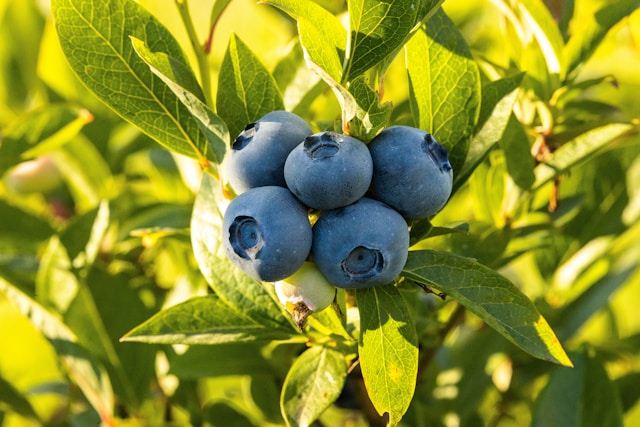The wild blueberry is considered one of the most valuable treasures of our native forests. While its cultivated relatives can now be found in every supermarket, the wild variety remains a special natural product with exceptional properties and represents a multifaceted addition to dietary supplements However. But what makes this small, dark blue berry so special and how can it support your health?
The wild blueberry vs. cultivated blueberry: a decisive difference
At first glance, wild and cultivated blueberries seem identical. However, the essential difference lies in the details: wild blueberries are significantly smaller, have a more intense aroma, and above all, deep blue flesh. Cultivated blueberries, on the other hand, have white flesh and are bred larger.
This seemingly small difference has a major impact on the nutrient content. The intense blue color of the wild blueberry comes from the Anthocyanins – secondary plant compounds known for their antioxidant effects. In wild blueberries, the concentration of these valuable compounds is up to four times higher than in cultivated blueberries.
Antioxidant power: Protection against free radicals
The high antioxidant content makes the wild blueberry a true superfood. These substances can neutralize free radicals that arise in your body due to stress, environmental toxins, or UV radiation. Free radicals can cause cell damage and are associated with premature aging and various health problems.
The anthocyanins in wild blueberries can help neutralize these harmful molecules. A comprehensive scientific review shows that regular consumption of anthocyanin-rich berries can increase the body's antioxidant capacity. This is especially interesting for fitness enthusiasts, as intense training can promote oxidative stress.
Skin health: Natural support from within
Your skin particularly benefits from the valuable ingredients of the wild blueberry. The antioxidants contained can help improve skin texture and protect against premature aging. Vitamin C, which is also abundant in the berries, can support collagen formation.
In addition, the anti-inflammatory properties of anthocyanins can be helpful for skin problems. People with impure skin often report improvements when they regularly consume antioxidant-rich foods like wild blueberries. The berries can contribute to a healthy, radiant complexion contribute.
Gut health: Promoting a healthy microflora
Your gut hosts trillions of bacteria that are crucial for your health. Wild blueberries can positively influence this important microflora. The contained fibers serve as food for beneficial gut bacteria and can promote the growth of healthy bacterial strains.
Scientific studies have shown that regular consumption of blueberries can increase the number of certain probiotic bacteria in the gut, including Akkermansia muciniphila, an important bacterial strain for gut health. A healthy gut flora can not only improve digestion but also strengthen the immune system, as about 70% of all immune cells are located in the gut.
The anti-inflammatory properties of the wild blueberry can also help reduce intestinal inflammation and strengthen the gut barrier. This is especially important for people with sensitive digestive systems or inflammatory bowel diseases.
Immune system: Strengthening natural defenses
A strong immune system is the key to your health. The wild blueberry can contribute to strengthening your defenses in various ways. The high vitamin C content supports the normal function of the immune system and can promote the formation of antibodies.
The anthocyanins can also possess immunomodulatory properties. This means they can help bring the immune system into balance – neither too weak nor overactive. This balancing effect can be especially beneficial during cold season.
A clinical study with adults showed that an eight-week supplementation with blueberry powder can cause significant changes in immune-related signaling pathways, indicating the immunomodulatory potential of the berries.
Additionally, the antimicrobial properties of the wild blueberry can help keep harmful bacteria and viruses in check. Traditionally, blueberries were used in folk medicine for various infections.
Further health benefits
In addition to the properties already mentioned, the wild blueberry can have further positive effects. The contained flavonoids can improve blood circulation and thus optimize the oxygen supply to the cells. This can have a positive effect on mental performance.
Wild blueberries can also be valuable for eye health. The anthocyanins can promote the regeneration of visual purple and thus support vision. Especially people who work a lot at the computer can benefit from this property.
Wild blueberries in the diet
To benefit from the health advantages of wild blueberries, you should regularly integrate them into your diet. Fresh wild blueberries are only available for a short time each year, usually between July and September. However, frozen varieties largely retain their valuable ingredients.
You can use wild blueberries in many ways: in muesli, as a smoothie ingredient, in yogurt, or as a healthy snack in between. Freeze-dried blueberries or high-quality dietary supplements can also be a practical alternative.
Nutrador® offers various products with wild blueberries that can provide you with a year-round supply of these valuable nutrients. When choosing, you should pay attention to quality and purity to achieve the optimal effect.
Conclusion: A small berry treasure with great effect
The wild blueberry is much more than just a tasty snack. Its unique nutrient composition can naturally support skin, gut, and immune system. The high concentration of antioxidants makes it a valuable component of a healthy diet and can be a good complement to Nutraceuticals can be taken.
While the wild blueberry is not a miracle cure, it can have positive effects as part of a healthy lifestyle. Regularly incorporating this little superfood berry into your diet can make an important contribution to your well-being.
Legal notice regarding health-related claims:
Our information is for general informational purposes only and does not replace medical advice. Dietary supplements do not replace a balanced diet and a healthy lifestyle. Health-related claims about dietary supplements must comply with the Health Claims Regulation (EC) No. 1924/2006 and be approved by the European Food Safety Authority (EFSA). If you have health complaints or questions, please consult a doctor.












